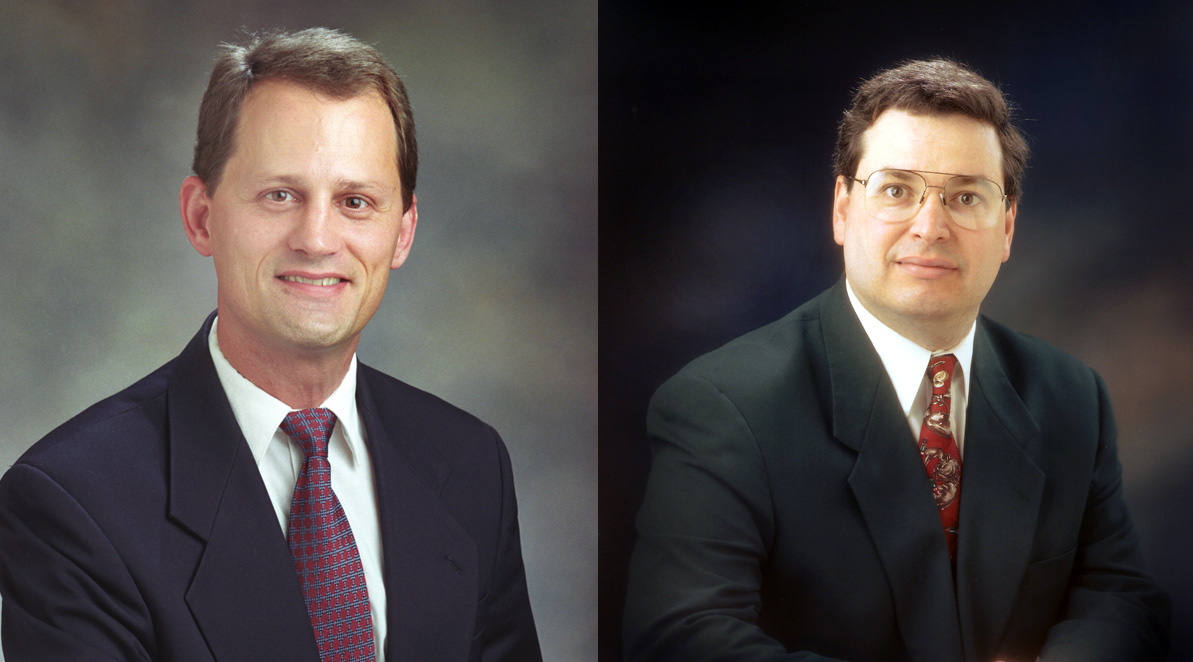Contact: Phil Hearn

(From left) Mark Horstemeyer and Mark Zappi
Two Mississippi State faculty members--one with research interests that include both the automotive industry and war on terrorism--are being named to endowed professorships in the university's James Worth Bagley College of Engineering.
Mark F. Horstemeyer of mechanical engineering, nationally recognized for his work on multi-scale material modeling, now holds the Center for Advanced Vehicular Systems Chair in Mechanical Engineering. While much of his previous work at Sandia National Laboratories in California is classified, some of it dealt with the war against terrorism and U.S. attacks on enemy forces hiding in the caves of Afghanistan.
Mark E. Zappi, who has generated a total of more than $9 million research funds while at MSU, will be the new Texas Olefins Professor in the college's Dave C. Swalm School of Chemical Engineering. He currently directs both the MSU Environmental Technology Research and Applications (E-Tech) Laboratory and the U.S. Department of Energy-supported Mississippi University Research Consortium for the Utilization of Biomass.
Established in 2001, the Texas Olefins Professorship is named for the Houston-area company founded in 1968 by Swalm, a 1955 MSU chemical engineering graduate and one of the university's major benefactors.
Zappi, who holds two patents as a result of his research efforts, has written more than 130 technical publications and given more than 150 technical presentations at numerous conferences. Before coming to MSU in 1996, he worked for more than 15 years as a research environmental engineer at the U.S. Army Engineers Waterways Experiment Station in Vicksburg. He is a specialist on the treatment of hazardous materials and the production of chemicals using bioprocesses.
He holds a bachelor's degree in civil engineering from the University of Louisiana at Lafayette, and master's and doctoral degrees in chemical engineering from MSU.
The Center for Advanced Vehicular Systems with which Horstemeyer now is associated was established in 2001 by the State of Mississippi with assistance from MSU. Conveniently referred to as CAVS, it works to provide the research and tools required by automotive companies to meet future engineering challenges and market demands.
Prior to coming to MSU last year, Horstemeyer spent 15 years at Sandia working on the application of solid mechanical principles to various nuclear and conventional weapons programs. He also helped design a cost-worthy and environmentally efficient model for the automotive industry.
He has received numerous honors, including selections as a Computational Fellow at the University of Minnesota and a recipient of the American Foundrymen's Society Award. The federal Department of Energy also presented him with its PECASE Defense Program Early Career Scientist and Recognition awards. PECASE is the acronym for Presidential Early Career Award for Scientists and Engineers.
Horstemeyer received a bachelor's degree in mechanical engineering at West Virginia University, a master's in engineering mechanics at Ohio State University and a doctorate in mechanical engineering at the Georgia Institute of Technology.
He is the author of more than 100 research journal articles, technical reports and conference papers. He also has served as an invited lecturer for a variety of educational, governmental and industrial audiences.